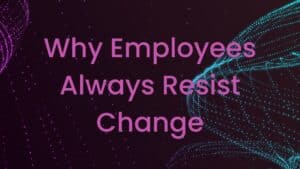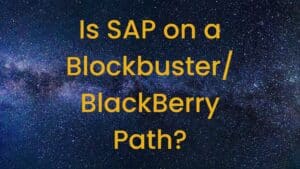When embarking on an ERP implementation, choosing the best ERP software for your organization is one of the most important things you can do. Today, I will outline our independent and technology-agnostic ranking of the top 10 systems in the ERP software market. There’s been some significant changes to this year’s top 10 list when compared to last year, so be sure to stick around to see who the new number one vendor is!
With hundreds of different ERP options in the marketplace, it can be overwhelming to figure out which system is the best for you. When you add the fact that software vendors are biased, and most industry peers and players are biased as well, it can be a bit overwhelming and daunting.
Being an independent and technology-agnostic firm gives us the luxury of evaluating and ranking the top 10 systems as we see them, related to how our clients select and implement these different solutions.
Before I jump into the Top 10 ERP Systems for 2022, I want to talk about the methodology we used. Our evaluation process is based on our customers’ experience with these different systems. We analyze and help clients implement all types of different solutions across a variety of industries, so we look at things like overall functionality, maturity of the system, ease of integration, flexibility, the overall customer adoption rates.
Those are just a few of the criteria we use to identify what are those best systems in the marketplace. The other caveat I’ll add is that this is a general ranking, so you might have very specific industry needs that might shuffle or scramble this top 10 list for your unique requirements.
I also want to be clear; we are 100% agnostic and completely independent. No software vendor or third party influenced or paid for this content in any way.
With that said, let’s just jump right in!
Table of Contents
ToggleHere are the 10 leading ERP software vendors:
10. Acumatica
Coming in at number 10 is Acumatica. Acumatica is a software vendor that was not in our top 10 list last year but has been upgraded to the top 10 this year. The reason Acumatica has emerged as an up-and-coming player is largely because they’ve defined a very clear niche in the marketplace. They tend to focus on manufacturing distribution organizations.
This product has a very clear user interface. The pricing model is very conducive to the small and mid-market. If you’re a low-volume, high-margin type of manufacturing or distribution company, it can be a very cost-effective solution with a very high ROI. The reason for that is because they have a very unique pricing model where they price based on transaction volumes.
If you have a lot of high-volume, low-margin types of products, it may not be a good fit. However, if you have moderate to low volume, but higher-margin types of products, it can actually be very cost-effective for organizations.
In addition to the extensive user interface, there’s also R&D dollars that are being pumped into the product via private equity firm that just bought the firm not too long ago, and that’s always a good sign of a product that’s up-and-coming when there’s private equity money behind it. With that, you combine all these things together, and that puts Acumatica at number 10 on our list.
9. Salesforce / FinancialForce
Coming in at number nine is Salesforce and FinancialForce. Now, this is a product that’s actually dropped a couple of notches in our ranking from last year, not so much because the product itself has changed or gotten less desirable, but because there’s other vendors that have made bigger strides and bigger advancements. Having said that, it’s important to note that many people view Salesforce as purely a CRM system.
I mentioned FinancialForce on the financial side, you have extensions like Rootstock, which is a vendor that’s built on Salesforce and provides manufacturing ERP capabilities, just to name two examples of products that provide ERP-like capabilities.
Now, Salesforce is a good fit for organizations that might be looking for more of a best of breed and a flexible type of solution. They can bolt on different types of systems or modules, to meet different needs as the organization grows. However, along with that comes a dark side, which is that a lot of organizations find that that flexibility can create a lot more complexity in terms of integration and cost.

It also puts more pressure on your I.T. department to maintain that system, so those are some things to think about, but in general, that’s enough to land Salesforce and FinancialForce at number nine on our list.
8. Odoo
Coming in at number eight on our list is Odoo, an open-source ERP system. It’s new to our top 10 list, although you may recall seeing it on our top 10 list of ERP systems for small businesses. This year it made the general top 10 list largely because we’ve seen it scale for some mid-size organizations as well, and for the general functionality and capabilities that the product has expanded to in recent years.
Open-source can be a good thing in terms of a price tag for the software licenses, but the downside is that as you start to add costs with different modules and capabilities. Your overall spend could actually go up.
The other downside of Odoo is that it can be complex to maintain, so if you don’t have a fairly sophisticated and mature I.T. department that can manage the complexities of an open-source system that just requires more I.T. support, that could be a downside as well.
There is also a consideration when it comes to scaling for large organizations. But for small and mid-market organizations, Odoo can be a very good fit, especially if you’re looking for something with maximum flexibility and modularity to be able to tie together different modules within the organization. With all that being said, that’s enough to land Odoo at number eight on our list.
7. Sage X3
Coming in at number seven is Sage X3, which is a product that fell a couple of notches from last year’s ranking, again not so much because Sage X3 is less desirable than it was before, but because other vendors have made further advancements in their product. But, Sage X3 in general is a great product, it’s a core financial system, great for manufacturing distribution types of organizations, as well as organizations that aren’t in manufacturing distribution.
Sage X3 is a good tier II alternative to some of the bigger ERP vendors in the marketplace, and some of the downside risks of the product include a couple of things. One is that we find it’s not as scalable for really large and complex organizations as some of the other products in our top 10 list. If you’re a larger, more sophisticated global organization, it may test the boundaries of your requirements.
The second thing is the user interface isn’t quite as clean or user-friendly as some of the other systems in the marketplace. With all that being said, that’s enough to land Sage X3 at number seven on our list.

6. Infor CloudSuite
Coming in number six on our list is Infor CloudSuite. This is a product that’s actually moved up in our ranking this year. One caveat I have to throw out there though is that the Infor CloudSuite umbrella is very broad, and maybe a bit misleading because there’s actually multiple systems within the Infor CloudSuite umbrella. They’re trying to brand or rebrand the product as CloudSuite, but you still have the segments of different products that they work with.
M3 is a product that we often see in manufacturing situations, we also see Infor Syteline as one of the solutions that we see in manufacturing types of environments. There’s also Infor Nexus, which is a supply chain management solution, which is actually one of our top 10 supply chain management systems in the market. The reason I bring up these three solutions is because Infor CloudSuite involves a lot of different systems, and the products within the CloudSuite umbrella that’s best for you are going to depend on your needs.
In general, when we look at the Infor CloudSuite umbrella, we find that it has a great, robust, and wide variety of business processes and capabilities. These can benefit different situations, especially organizations that are in manufacturing and distribution, but we also see Infor being used successfully by non-manufacturing organizations as well.
They also have a lot of R&D dollars as a result of Koch Industries putting in a lot of money into the acquisition of the company. The downside of Infor however, just like every product in our top 10 list, is largely the product roadmap and understanding which of these systems to piece together to give you the solution you need. This can be very confusing, even daunting, and it’s important to really make sure you’re identifying the right solution, whether it’s M3 or Syteline or Nexus, or some of the other solutions that they offer.
The other consideration is the cost of the solution tends to be a bit higher than some of the others that we’ve covered so far in our top 10 list. However, those cost differences can oftentimes be negotiated away.
With all that being said, that’s enough to land Infor CloudSuite at number six on our list.
5. IFS
Coming in at number five on our list is IFS, and IFS was in our top five last year, it actually dropped just one slot this year. Great product, strong enough to finish in our top five, and the reason it has taken residence in our top five is because it is a very focused solution. It’s not trying to be everything to everyone, and it tends to focus on industrial, manufacturing, and distribution types of companies. If you’re a company that has a lot of project management, asset management, or maintenance and repair types of functions, IFS is a very good fit.
The reason it fell from number four to number five is largely because it’s narrowed focus which isn’t necessarily a bad thing, but when we’re looking at a broad, general ranking like this one, there’s other solutions that can provide varied capabilities to meet a number of different clients’ needs. If you’re one of the organizations that fit within that sweet spot of IFS, you might actually put IFS at number one on your list.
What it really comes down to is understanding what the strengths of the product are relative to your needs. If it has a good user interface, there’s a lot of R&D dollars being spent on the product itself, and the organization is also focusing on expanding its value-added reseller network, and implementation partners. This investment in future growth will secure a bright future.

The downside of the product is that it can be a little more expensive than some of the solutions in the marketplace. We find that dollar for dollar, you’re going to spend a bit more on IFS, but you may be getting better capabilities if it’s the right fit for you. The other big downside of IFS is largely perception-based, which is that a lot of organizations haven’t heard of IFS.
IFS is a European-based company, they have a good presence in Europe, and they’re still expanding and working to increase their market share in other parts of the world. As far as reference ability and having peers that use the product, you’re not going to have as many peers using IFS as maybe some of the other products in our top 10 list. With that being said, this is enough to land IFS at number five on our list.
4. SAP S/4HANA
Coming in number four on our list is SAP S/4HANA. It’s actually moved up a couple slots from last year, largely because they’re starting to get some traction and momentum on building that maturity that they’ve struggled with for the last few years since S/4HANA was released several years ago.
Now, S/4HANA is very strong in financials, inventory management, sort of your vanilla, basic ERP functionality, etc. It’s really one of the best when it comes to financial flexibility, GL capabilities, product costing, all that stuff.
Where S/4HANA tends to struggle, is once you get outside the core and you start to look at other advanced capabilities like manufacturing, planning, product lifecycle management, even some of the CRM capabilities are lacking. It’s still not as mature of a product as it could be and will be someday. It’s certainly not as mature of a product as the old ECC product was, or even R/3, which are the old legacy SAP products, so that’s probably the biggest thing holding back the product.

What SAP has done to partially address that is to go acquire other companies. They’ve acquired products like Ariba on the procurement side of things, SuccessFactors on human capital management, Concur as relates to time and expense. They’ve become somewhat of a best-of-breed provider, but with that comes a dark side, which is now you have multiple systems that you need to tie together.
The SAP roadmap is still a bit clunky and difficult to navigate in terms of understanding what products are the right fit for you within the SAP umbrella. But having said all that, just based on history and based on SAP’s track record, especially with larger, more complex organizations, I’m fairly confident that SAP will get there and S/4HANA will get there soon enough.
We actually have seen a significant amount of progress here in the last couple of years as relates to innovation and that’s enough to land SAP S/4HANA at number four on our list.
3. Oracle ERP Cloud
Coming in number three on our list is Oracle ERP Cloud. Along with SAP, is one of the gold standards for larger Fortune 1000 types of organizations. When we compare Oracle to SAP Cloud and really just explain why Oracle is ahead of SAP, it’s largely because Oracle’s a more flexible product. It’s something that can be tailored more easily than S/4HANA can be in general.
It shares many of the same challenges with SAP in that Oracle ERP Cloud is still a work in progress. There’s still a lot of advanced manufacturing capabilities that aren’t baked into the system yet. Having said all that, Oracle ERP Cloud is a very broad and robust product that can meet a lot of different industry needs, especially if you’re a diversified, larger, more complex organization, and if you value flexibility and ease of integration, Oracle can be a great fit.
2. Oracle Netsuite
Coming in at number two is last year’s number one solution, which is Oracle NetSuite, and still a very solid, respectable ranking at number two in our top 10 list. But it did drop, and the reason for that is largely because we’re seeing some concerning trends with NetSuite, but let’s start with the positives first.
The positive aspects of Oracle NetSuite are that it’s one of the pioneer software-as-a-service types of solutions. It’s been in the cloud for 20 years, well before all the other vendors tried to play catch-up, so they have a very mature solution that’s been in the cloud the entire time it’s been around. It was built for the cloud, it has an architecture built for the cloud as well.
Netsuite also focuses on small and mid-market companies, so if you’re a fairly vanilla small, mid-market company, and you’re looking to upgrade from QuickBooks or your basic accounting system, NetSuite can be a logical next step in your evolution through the digital transformation.

The downside of Oracle NetSuite is the pricing is fairly high, especially for small and mid-size organizations. It can actually be pretty costly in the long term because you have a recurring subscription model with a lot of hidden costs that can actually escalate over time.
The other downside that really held it back from being in the number one slot is that we’re starting to see more issues with implementations with Oracle NetSuite. This is just strictly a hypothesis, but my theory is that Oracle since they acquired NetSuite, has gotten so aggressive with pushing further into the small and mid-market, but also pushing upstream to larger organizations. It seems as though they may be getting over their heads in some cases with where they’re selling Oracle NetSuite. Be sure that you understand whether or not Oracle NetSuite really can meet your needs, and that you’re getting an agnostic view of that evaluation.
The final thing that really holds back Oracle NetSuite is the fact that it does have a lack of flexibility when compared to other systems in the marketplace. If you don’t like the way NetSuite was built, it’s very hard to change, when you compare it to say a Microsoft D365, or an Oracle ERP Cloud. That lack of flexibility relative to the other systems is partially what holds it back, but again, very solid, respectable number two on our top 10 ranking for this year.
1. Microsoft D365
Coming in at number one is a new number one, which is last year’s number two system, and that is Microsoft D365. The primary reason why D365 is number one is partially because there’s two different solutions that D365 offers. There’s Business Central, which is built for small and mid-market companies, and then there’s Finance and Operations, which is for larger, more complex organizations.
You have two distinctly different systems meeting distinct needs of different types of organizations, but on top of that, you also have the flexibility and the user interface of Microsoft. A lot of companies are comfortable with that user interface and value the flexibility that D365 provides, especially when you compare it to, say, an Oracle NetSuite or an SAP S/4HANA, Microsoft D365 can be a lot more moldable.
The dark side to this though is that just because you can change the D365 system doesn’t mean you should. A lot of organizations get tripped up during the implementation because they try to over-customize the system. The other appealing factor of Microsoft Dynamics is the fact that it’s so easy to integrate with other systems, and that it has that Microsoft look and feel, those are some of the common reasons why many of our clients opt to go with D365.

I should note that the negative of using D365 is their value-added reseller network, it is a complete mess. There are just way too many providers out there. They’re selling D365, they’re implementing D365, when they may or may not be qualified to do so. I’d say of all the vendors in our top 10 list, Microsoft probably has the least amount of control and oversight of their reseller network, and that’s a big problem when it comes to implementation.
In the end, if you do choose Microsoft Dynamics 365, just know that the product itself may be ranked number one on our list, but when you choose the implementation partner, you want to make sure you look carefully at the options you have. That whole ecosystem has a high degree of variability in the competencies in terms of the implementation providers.
Honorable Mentions
While we just shared the top 10 list with you, there’s a lot more systems that didn’t make our top 10 list. Some examples include two vendors that were in our top 10 list last year but fell out of the top 10, and those are ServiceNow and Workday. It’s not so much that those products are inferior compared to the other top 10, but they are just not as complete of an ERP product as the others in our top 10..
In addition to those two systems that fell out of our top 10, there’s a whole host of other systems that are great products that you could argue should be in the top 10. You have products like Epicor, which is a product that’s very strong in the manufacturing and distribution space. Deacom, which focuses on process manufacturing. Aptean, which is a great product portfolio with a lot of private equity investment behind it.
Those are just a few examples of some of the products that didn’t make the top 10, but what I’ll note is that even if a product didn’t make the top 10, doesn’t mean it’s not in your top 10 or shouldn’t be on your shortlist. Be sure you take this all with a grain of salt and really look to your specific requirements to understand where you could use the most help, and where the technology can help you the most.
I hope you found this information useful. I encourage you to download our annual Digital Transformation Report, which includes the top 10 rankings of ERP systems, as well as warehouse management systems, supply chain management systems, CRM, all other types of technology. That same report also provides a host of best practices as relates to the people, process, and technology side of digital transformations.
If you have feedback or questions regarding our system ranking please reach out to me directly. I’m always happy to be an informal sounding board for you and your team.

FAQ about ERP Systems for 2022
What is an ERP software system?
ERP stands for Enterprise Resource Planning. It is a software system that enables businesses to streamline their processes and operations to improve efficiency and productivity. An ERP system can help manage various aspects of a business, such as a resource planning, inventory management, accounting, reporting, customer relationship management (CRM), sales tracking, and more. It can also act as a central hub that integrates data collected from different business functions into one comprehensive system. This allows businesses to gain greater visibility and control over their operations, allowing them to make more informed decisions and become more agile in responding to market changes.
An ERP system provides many benefits for businesses, including increased efficiency and productivity, reduced costs, better customer service, and improved decision-making. It also helps companies become more competitive in the marketplace by providing them with a comprehensive view of their operations and processes. Additionally, an ERP system can help businesses reduce human errors and increase transparency by eliminating manual data entry and providing real-time visibility into the company’s operations and performance.
Overall, an ERP system is an essential tool for businesses looking to maximize efficiency, reduce costs, and gain a competitive edge in the market. By streamlining operations and integrating data from different business functions into one central hub, an ERP system can help businesses become more productive and efficient while gaining greater insight into their operations.
What are the top 3 ERP systems?
Our favorite line – it depends! Any technology should be unique to the needs of the specific organization. That said, some ERP systems stand out from the rest. The three most popular ERP solutions on the market today are Oracle NetSuite, Microsoft Dynamics 365, and Oracle ERP Cloud.





